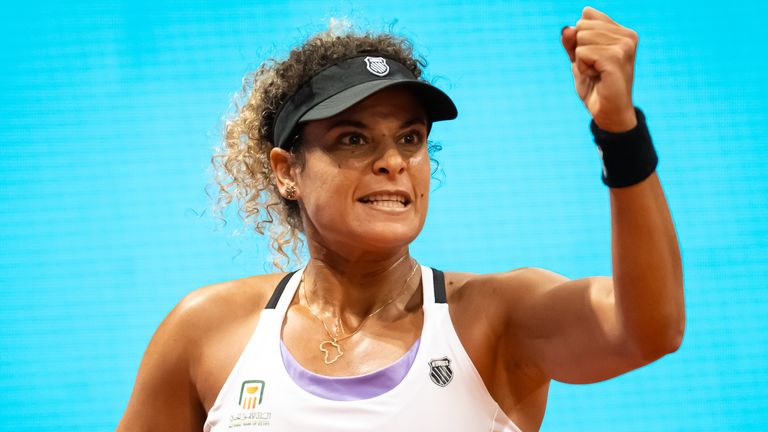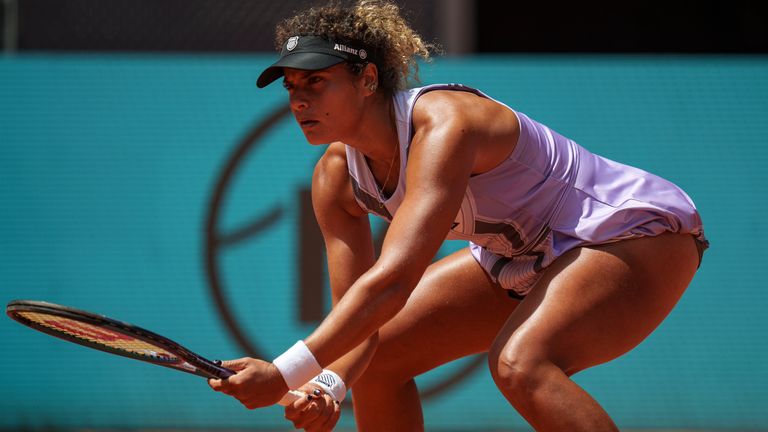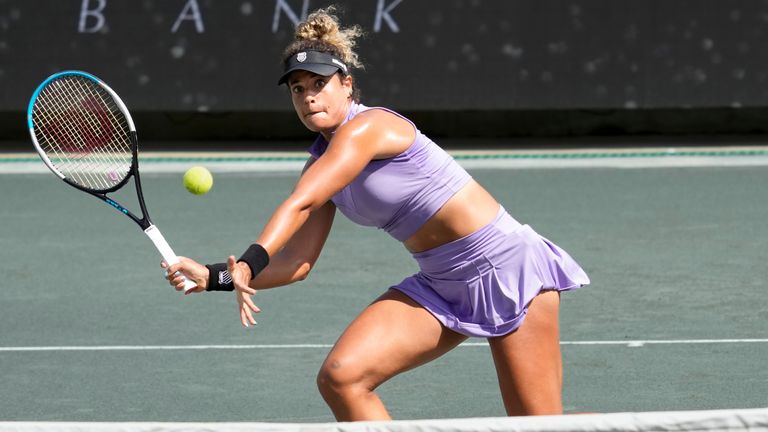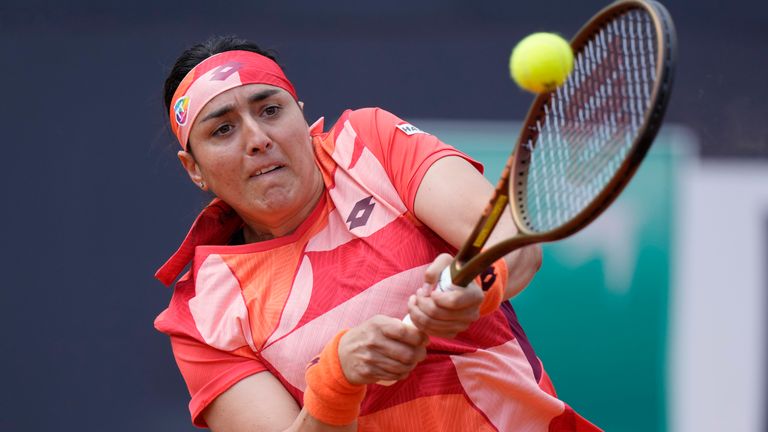Mayar Sherif: The Egyptian history-maker out to inspire next generation of Arab women tennis players
Mayar Sherif tells Sky Sports she wants to help other young girls from north Africa pursue their tennis dreams; Sherif: "I think women are more eager to succeed or they have more motivation to prove themselves because of the little suppression we have in north Africa or in the Arab world"
Monday 29 May 2023 11:07, UK
As a young girl growing up in Egypt Mayar Sherif would sit and idolise Kim Clijsters and Amelie Mauresmo while the pair climbed to the summit of women's tennis, conditioned to believe her own dreams would remain confined to that of a distant admirer in north Africa.
She is here. And whether or not she touches the glistening heights of a Clijsters or a Mauresmo, Sherif has no intention of allowing other young women from the Arab world or Africa to conform to the same narrative.
The 27-year-old, who was born in Cairo, currently sits at a career-high ranking of 43 as she gears up for her return to Roland Garros, where she made history as the first Egyptian woman to reach the main draw of a Grand Slam at the 2020 French Open.
She still remembers the words of those that gave her little-to-no chance.
"Oh my gosh, so many said I wouldn't make it, 90 per cent of the people said I couldn't make it," Sherif tells Sky Sports. "The only person or two people were my parents, maybe one of my sisters, who always believed I was good, but that was literally it.
Trending
- Transfer Centre LIVE! Guehi, Trent, Zirkzee latest
- Liverpool not for sale amid claims Elon Musk 'interested' in buying club
- Man Utd latest: 'Mainoo and Garnacho sales to be reluctantly considered'
- Arteta says Carabao Cup ball a factor in Arsenal's wasteful finishing
- Papers: Man Utd exploring loan move for PSG forward Kolo Muani
- Isak and Gordon shock Arsenal to give Newcastle Carabao semi-final advantage
- Liverpool latest: Elon Musk owning Liverpool? Have your say!
- Arsenal 0-2 Newcastle highlights
- Newcastle latest: Howe hails unique nine-day winning run on the road
- Potter closing in on managerial return with West Ham
"If I hadn't found my coach I have now, who helped me financially and believed in me more than I believed in myself, I might not have made it, that gave me a huge push mentally to believe I could get to where I am now."
- Murray withdraws from French Open I Brit to prioritise Wimbledon build-up
- Johanna Konta: Emma Raducanu can come back stronger I She will want to play US Open
- Andy Murray can be a force to be reckoned with at Wimbledon
Sherif paints the picture of a narrow path to opportunity in her home nation, hindered by the void of clear structure and system but also outdated perceptions of women's sport.
"I think women are more eager to succeed or they have more motivation to prove themselves because of the little suppression we have in north Africa or in the Arab world with the women's situation," she explained. "We try to get out of that with more motivation, I think more women's sports are succeeding much better than before."
With her rise through the ranks and the accompanying outcry of support for her success from Egyptian fans comes enhanced, landscape-altering awareness.
"It's never easy (being a female athlete in the Arab world)," Sherif continued. "Talking in my country, what's expected from you as a woman is that if you go to college 'good for you' but after that you're getting married, raising kids and you stay with your kids at home and cook for your husband.
"That's sometimes the mentality, even with some of my friends, just to have this stable life and have a husband, kids and that's it.
"It was very hard, even for the people around me like some of my friends and family, to understand me when I said 'I want this really bad, I want to get out and explore and see what I can do out there, even if I'm going to be by myself'.
"Just to prove myself and prove that even if I fail I've tried my best, it was hard for people to understand that as well."
The feats are beginning to stack up for Sherif. At the 2019 African Games she won gold to pave the way to her becoming the first Egyptian woman to qualify for the Olympics in tennis; in 2020 she made her historic French Open debut, prompting a social media shout-out from Liverpool star Mohammed Salah; in 2021 she became the first Egyptian woman to win a Grand Slam match by beating Chloe Paquet at the Australian Open, as well as becoming the first Egyptian woman to make it to a WTA Tour singles and doubles final - in Cluj-Napoca - and the first Egyptian woman to enter the WTA top 100.
She went on to make further history as the first Egyptian woman to win a main-draw match at the French Open in 2022, before defeating world No 7 Maria Sakkari in Parma to become the first woman from her country to win a WTA Tour title.
This month she toppled fifth seed Caroline Garcia and 24th seed Elise Mertens in Madrid on her way to the quarter-finals of a WTA 1000 event - another first for an Egyptian woman - in the process underlining her growing threat on clay.
"The reaction to Madrid was huge, I had the Minister of Sport reach out to me, I had all my sponsors reach out," she explained.
"Everybody on social media was making sure everybody in Egypt knows about it so it's very nice that the action of the people of Egypt and Africa and the Arab world is big, because our sport really needs a lot of work and hopefully that gives hope to the next generation to look up to us and work on themselves to get to where professional tennis is."
- The story of Novak Djokovic I Rafael Nadal: The king of Clay I News in brief
- Roger Federer: A gift from the tennis gods I Serena Williams: The career of a tennis icon
- Get Sky Sports | Download the Sky Sports App I Watch with NOW
Sherif was naturally introduced to the sport as a child by way of her parents' love for tennis along with that of her older sister Rana Sherif Ahmed, who has previously represented the Egyptian Fed Cup team.
Knowing she wanted to make a career of it was one thing, carving out a route into the game was an entirely different challenge.
"It wasn't easy at all, it was very hard to find practice, we didn't have the financial support from my country and there were no sponsors to finance the good players," she explained.
"Even though I was very good in Egypt and in Africa when I was younger, I still didn't have the financial support to get me to a good level.
"So it was tough, from all the aspects. There was no system, no good fitness with good nutrition and physios, there's no institution to help get everything together to get professional athletes."
She has earned the right to prioritise fulfilling very real prospects of breaking into the world's top 20 - something Sherif believes she can do with more consistency - but is equally tuned in to the flag-bearing role she has developed and the opportunity to assist the next generation.
Among her goals off the court is mapping out a clearer path for young children in Egypt and the Arab world to pursue careers in professional tennis.
"We are already working on it and hopefully that will happen at the end of this year," she explained. "What I'm seeing now is that with my success sponsors have started to look more into tennis helping youngsters to try to reach the professional game.
"I really want to start this out, I think I'm going to start this out at the end of the year and let's see how it's going to go."
Sherif is a long-time friend of Tunisian world No 3 Ons Jabeur, who has similarly shouldered a trail-blazing onus as the highest-ranked African and Arab player in history.
"We don't really talk about it, we just have the respect for each other," said Sherif. "If I ever need anything I go and ask her, she's very helpful for me, she's super helpful, very nice and funny. I've known her from such a young age so we're good friends."
Between them they have embraced the unwritten job of serving as a beacon for Arab athletes.
"It's a huge responsibility but honestly I do enjoy it because I feel that as long as I'm doing my best, have a good image on the court, being a good role model for the young generation it's good for them," she said.
"I think the result will be good for them. I'm trying my best, it gives me motivation to have a better attitude on the court and to reach more so these young girls and boys see that and see where they can get in tennis."
Sherif's immediate focus now turns to Roland Garros where she is seeking to produce her best return yet after being forced to withdraw from the second round last year due to injury.
"I'm very excited for the French," she added. "I know I'm very uncomfortable to play on those courts so I can't wait, I'm going to go out there and enjoy myself."
Sherif's performances in Madrid - at a level she deems well shy of her best - have given her added belief heading into one of her favoured majors, though the Egyptian is aware of the strength in depth that continues to make the women's tour so unpredictable.
"The level is very similar, you see the top 10 or top 15, the only difference is they're much more consistent than the other players," she noted.
"They have some other qualities but really anybody can beat anybody and you have to be attentive because it can hit you in the first round, you think you're playing a player you should beat and then realise you could lose at any time.
"You have to respect everybody, you have to be humble and play everybody and every round like it's a final.
"I would like my image to be one of a hard worker, on the court and off the court I try to be humble and respect everybody. Hopefully in Egypt and Africa in the future my dream is to get more players from this zone to go out and be professional players.
"I don't see it as far, I just see that we need a system. With having tennis in these zones and sponsors that want to help young players, I feel I would love to contribute to that in the future."






